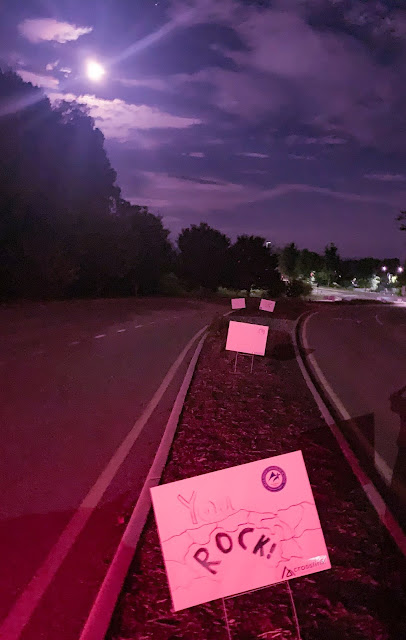Legacy of the Plague
“Blessings for all you do.”
“You Rock!”
They arose from the grass on the median strip and stood there, beautifully askew in the pre-dawn moonlight; dozens of them. Created by local youth deprived of their classrooms and isolated at home, they served as little testaments of gratitude towards our local medical community. As I drove through the main entrance of my hospital’s campus and took notice of the homemade signs, I felt my emotions bubble, as every picture’s unique design revealed the creativity of one particular child. With the assistance of parents and teachers, these kids were tasked with providing inspiration to hospital personnel working the front lines of the COVID pandemic...and they succeeded. I found the homemade display a refreshing reprieve from the usual mundane outdoor signage directing patients to various departments within the hospital campus. As an impaired physician four years into my recovery from alcohol, I felt a gratitude that I would not have recognized within myself during my active drinking years.
On November 3rd 2016, I overdosed on alcohol and valium and was transported via EMS, sirens blaring, into the very emergency department where I had been a practicing physician for 20 years. I was stabilized, hospitalized, and ultimately transferred to a drug and alcohol rehabilitation facility. Over the ensuing days, weeks, and months I learned what it meant to be an impaired medical provider in recovery. I attended individual and group therapy, diligently worked a 12 step program, and enrolled in my state’s health practitioner’s monitoring program. I spent numerous hours with other recovering physicians, attended daily AA and NA meetings, worked with a sponsor, and studied my disease. After nine months of mandated unemployment, I was finally approved for work in an urgent care clinic. After another year, the monitoring program granted me return to the practice of emergency medicine. Another twelve months after that the director of my old emergency department offered me my job back. I was interrogated by my hospital’s wellness panel, scrutinized by the credentialing committees, and ultimately approved by the medical executive board. The rest, I am proud to say, is history- I am two years back working as a full-time emergency physician, and feel like I am at the top of my game.
Although my story is a provisional victory- and forever a work in progress- it was only through willingness to be vulnerable and divulge my situation to the world that I was able to successfully recover and return to the profession I love. My rehabilitation was only possible with an enormous degree of outside support- there was no way I could have undergone such a fundamental transformation alone. Naturally, there remained major bias against me. Sadly, the stigma of alcoholism and addiction in the medical community is alive and well. For every story like mine, there are many other providers out there hiding or in denial of their addiction out of fear of the repercussions on their license and reputation. Credentialing bodies and state licensing authorities uniquely single out the diseases of alcoholism, drug addiction and mental illness on their hospital privilege application questionnaires, making it more expedient for impaired practitioners to hide their illness at the expense of their own health, and ultimately to the detriment of their families and the patients they serve.
Nurses and doctors have, as a whole, managed to successfully rise to the challenges their current work environments demand. We jumped through the necessary hoops to obtain our licenses and navigated through even more hurdles to remain in good standing with our respective oversight bodies and in our workplaces. When the COVID pandemic blindsided us, we did a gut-check and handled with poise whatever came our way, donning uncomfortable PPE, serving on committees to address the logistics of the crisis, and quarantining ourselves when the situation demanded it. Those of us in long-term recovery, I believe, have been able to successfully cope with this once-in-a-century event from an emotional standpoint because of, rather than in spite of, our disease. We seem to be well-equipped to handle the secondary effects the current societal shut-down and policies of isolation have created. The spike in alcohol relapses, drug overdoses, and domestic violence among the patient population are now overwhelming our emergency departments in a way I have never encountered in my 25-year career. Those of us in remission from our chemical dependencies are not only on the front lines of the plague itself, but simultaneously battling this horrendous secondary effect.
Healthcare workers in long-term recovery are capable, competent practitioners during this pandemic precisely because we are receiving the help we need and working a program tailored to our own personal wellness. We are, quite literally, rising to the occasion, even reaching out to our medical peers in crisis. So why does the medical community regard us with such suspicion, as if our illness was some sort of impediment, some moral failing? Until this gargantuan issue is addressed, more of our own will lose their careers and lives out of fear of “coming out” in front of the medical establishment.
When I drive to work and see childrens’ homemade signs rooting us on and telling us to be brave, I can’t help but fancy that they are referring to not only the fight against some virus, but also the unspoken, ongoing secondary plague of our time- alcoholism and drug addiction secretly ravaging the medical community. To the children, I am grateful.
Out of the mouths of babes.
—JD Remy, MD





Comments
Post a Comment